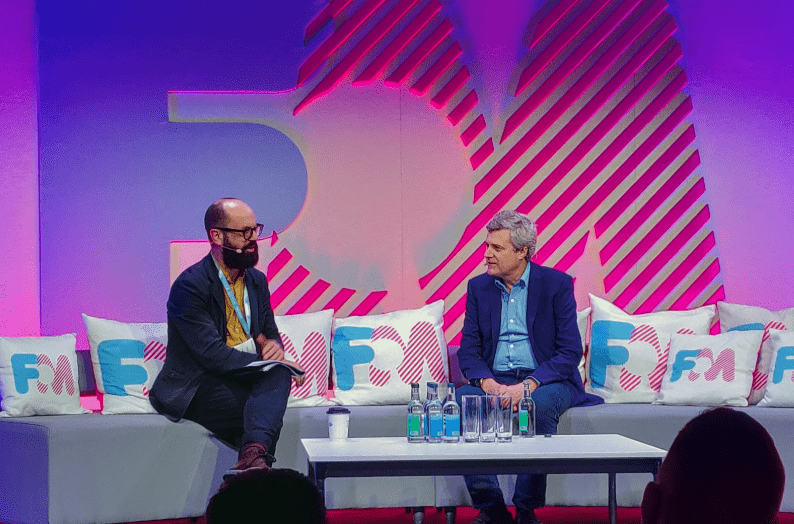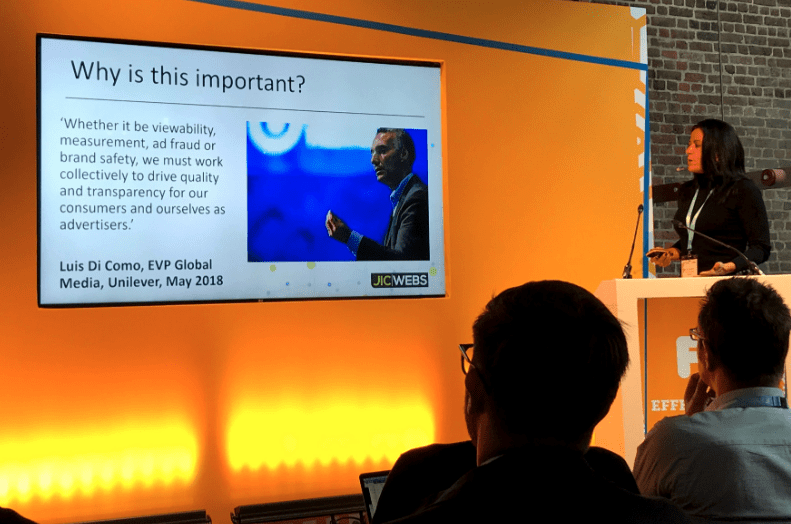Tesco CEO explains how they used emotions to build consumer trust
WPP CEO also speaks on the advantages of fusing tech and creativity while founder of JICWEBS outlines its new initiative to tackle fraud on a global scale at the Festival of Marketing
Tesco’s Chief Executive Dave Lewis has revealed the part emotions has played in rebuilding the brand’s trust among consumers.
Speaking at the Festival of Marketing, Lewis talked about Tesco’s transformation over the past five years and what the brand has done to help restore trust among customers, which was at an all-time low when he joined the company.
He set the marketing team the challenge of re-engaging with consumers on an emotional level. They responded by launching the company’s ‘Food Love Stories’ campaign, which showed how various customers are using different ingredients bought from Tesco stores to share the love.
The stories include a dad showing his love for his daughter by changing their family casserole recipe because she’s become a vegetarian, and a daughter baking her mum her special homemade cupcakes to say sorry for an argument they had. The ads are all extremely heartwarming and help to shine a light on real people, and how they use food to connect with each other.
He also spoke about his steep learning curve since joining the brand, and just how many people the brand touches every single day. For example, did you know that in the UK alone Tesco stores tills ring 49 million times a week?
Lewis was just one of many speakers at the Festival of Marketing last week, which ran for two days in London’s Tobacco Dock, and is the UK’s biggest marketing event.
Red hot topics at the festival this year were personalisation and trust and transparency, and from the packed sessions, it’s clear marketers see these as really important issues they need to tackle head on over the next few years. Trust and transparency has always formed the foundation of everything we do at Unruly, from our in-house brand safety team to our Trust Talks events that are held around the globe.
Fusing tech and creativity
Also speaking at the festival was WPP’s CEO Mark Read, who talked about taking over the reins from Sir Martin Sorrell and his experience being at the helm of the holding company over the past year.

He outlined his ongoing work to fuse together tech and creativity, and how he believes the two need to work hand in hand in order for an advertising campaign to be successful, and how focussing too much on one or the other can have disastrous results.
We’ve seen this play out time and time again when we’re testing ads for clients at Unruly. Many brands invest a lot of money into the creative but fall at the final hurdle because not enough research was carried out around what emotions they elicit from viewers and how they’d react.
Two prime examples are the VW and Philadelphia ads that were both recently banned by the ASA following complaints from they featured harmful negative gender stereotypes.

Tackling fraud on a global scale
JICWEBS CEO Jules Kendrick was also at the festival talking to marketers about some of the risks involved in digital advertising. JICWEBS set standards that companies can be audited to, increasing transparency around how they operate. Companies from across both the buy and sell sides of the advertising world are involved in the initiative, including Unruly. You can find out more about what they do here.
It’s not surprising to hear they’ve had a lot of calls from many of the companies they work with to roll out their solutions on a global scale. In response to this, Jules announced the company is working with its US counterpart, TAG, to streamline its processes to ensure certifications are recognised around the world.
Addressing ageism
Lloyds’ Director of Marketing Communications, Richard Warren, also appeared on an interesting panel addressing ageism within the marketing industry, looking at how the under 50s are unfairly represented in advertising campaigns, and how they are lumped together as an audience and targeted with ads they have no interest in.
He spoke about the bank’s approach to advertising, and how because they have such a diverse audience to reach out to, they instead prefer to not focus too much on individual people in their ads.
He gave the example of Lloyds’ horse mascot, and how this is often used in its advertising instead of people.
He also mentioned a recent campaign they’ve been working on with GoPro. In this campaign, in order to avoid having a visual protagonist, everything is filmed in the first person using a headcam, so when you watch the ad it’s up to you to imagine who the protagonist is.
At Unruly, we use our emotional testing tool, UnrulyEQ, to show how different age groups respond emotionally to the same creative.
Find out more about Unruly’s offering, and how we can help supercharge your ads.
